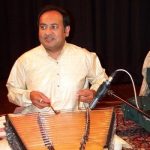Pandit Nandkishor Muley
 Nandkishor, or Nandu, as he is known to the Western public, comes from a family of traditional musicians in Baroda in western India, who transmitted the tradition of kathakar (or kirtenkar). Nandkishor’s grandfather was a kirtenkar, reciting and singing mythological tales in the temple. His father, Dattatreya, was a highly regarded veena player (a lute-like instrument) and taught vocal arts at the Maharaja Sayajirao University of Baroda.
Nandkishor, or Nandu, as he is known to the Western public, comes from a family of traditional musicians in Baroda in western India, who transmitted the tradition of kathakar (or kirtenkar). Nandkishor’s grandfather was a kirtenkar, reciting and singing mythological tales in the temple. His father, Dattatreya, was a highly regarded veena player (a lute-like instrument) and taught vocal arts at the Maharaja Sayajirao University of Baroda.
Nandkishor began his musical training at an early age with his father as well as with his uncle (Shrikant Muley, professor of sitar at the same university), who taught him Indian classical vocal arts and tabla. He notes the importance of singing to traditional Indian instrumentalists, since their goal is to make the instrument “sing.” By studying the vocal arts, an instrumentalist learns how to present the raga and how to “put the notes and intervals together.”
Under the guidance of Pandit Sundarlal, Nandkishor also studied the classical North Indian dance kathak, making him the first in his family to have studied dance and music together. As he observes, the word for music, sangeet, actually means “vocal and instrumental music and dancing.” Dance is conceptually not separated from the music, and its rhythm has affected his musical improvisation. He received a master’s degree from Maharaja Sayajrao University in Baroda as well as a Diploma in tabla and vocal music.
Fascinated by the santoor playing of the virtuoso Pandit Shivkumar Sharma, Nandkishor decided to learn the instrument. Eventually he went to Bombay in order to study santoor full-time with his guru. After finishing his santoor training, he was awarded the prize of “Surmani” (“Diamond of Notes”) from the Sur Singar Samsad Music Association (Bombay, 1975-76). Nandkishor has been one of the senior-most disciples and benefited tremendously by virtue of close rapport with his guru. His association with the late Acharya K.G. Ginde while on the faculty of Vallabh Sangeetalaya, Bombay opened newer horizons for him. Nandkishor’s santoor playing acquired the full-bodied singing style (Gayaki) dimension of this senior vocalist. He has evolved a style of his own.
Nandkishor is active in the teaching of Indian musical arts and in spreading Indian culture throughout the European continent and North America. He has performed in the Festival of India in Berlin and throughout Germany, in the World Music Festival in Helsinki and in many other major musical events. Several of these performances have been recorded for radio broadcast. An officially recognized musician for All-India Radio, he also spends several months of each year performing and teaching in India. Through his performing and teaching activities, Nandkishor has become recognized as a leading proponent of the santoor.
In 2001, Pandit Muley was awarded the Excellent Art and Cultural Educator award from United Arts of Florida for his contribution of Indian music and culture to various Florida Schools and Universities. In 1994 he won the German Grammy Award, and in 1995 was nominated best instrumentalist for the Diva Music Award from India music industries in Bombay.
Since 1997, he has been teaching Indian Music in the Central Florida region. He is an adjunct professor at Stetson University, University of Central Florida, and Chinmaya Mission Orlando.
At home in India, he is accredited santoor artist on the [All India Radio], Akashvani network as well as Doordarshan. Every year he spends a few months in India teaching and performing at various festivals or for cultural organizations.
